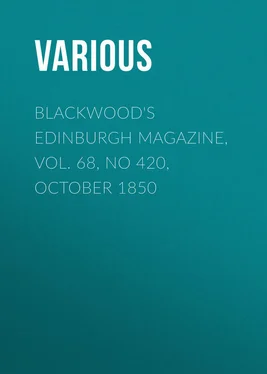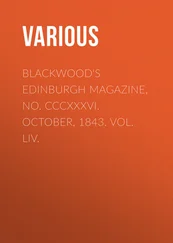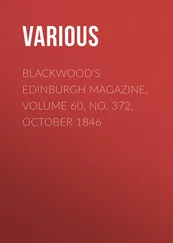Various - Blackwood's Edinburgh Magazine, Vol. 68, No 420, October 1850
Здесь есть возможность читать онлайн «Various - Blackwood's Edinburgh Magazine, Vol. 68, No 420, October 1850» — ознакомительный отрывок электронной книги совершенно бесплатно, а после прочтения отрывка купить полную версию. В некоторых случаях можно слушать аудио, скачать через торрент в формате fb2 и присутствует краткое содержание. Издательство: Иностранный паблик, Жанр: periodic, foreign_edu, Путешествия и география, на английском языке. Описание произведения, (предисловие) а так же отзывы посетителей доступны на портале библиотеки ЛибКат.
- Название:Blackwood's Edinburgh Magazine, Vol. 68, No 420, October 1850
- Автор:
- Издательство:Иностранный паблик
- Жанр:
- Год:неизвестен
- ISBN:нет данных
- Рейтинг книги:4 / 5. Голосов: 1
-
Избранное:Добавить в избранное
- Отзывы:
-
Ваша оценка:
- 80
- 1
- 2
- 3
- 4
- 5
Blackwood's Edinburgh Magazine, Vol. 68, No 420, October 1850: краткое содержание, описание и аннотация
Предлагаем к чтению аннотацию, описание, краткое содержание или предисловие (зависит от того, что написал сам автор книги «Blackwood's Edinburgh Magazine, Vol. 68, No 420, October 1850»). Если вы не нашли необходимую информацию о книге — напишите в комментариях, мы постараемся отыскать её.
Blackwood's Edinburgh Magazine, Vol. 68, No 420, October 1850 — читать онлайн ознакомительный отрывок
Ниже представлен текст книги, разбитый по страницам. Система сохранения места последней прочитанной страницы, позволяет с удобством читать онлайн бесплатно книгу «Blackwood's Edinburgh Magazine, Vol. 68, No 420, October 1850», без необходимости каждый раз заново искать на чём Вы остановились. Поставьте закладку, и сможете в любой момент перейти на страницу, на которой закончили чтение.
Интервал:
Закладка:
" Attorney-General. – You, living at Newport, can tell us that there was no notice by placard, or in any other way, of a meeting to be held on the 4th November? — A. I never saw any.
" Attorney-General. — Nor heard of any? — A. No. "
Such was the meagre case in behalf of the prisoner in point of evidence. And at its close, his second counsel, Mr Kelly, rose to address the jury on his behalf – a privilege accorded to no prisoner, except one tried on a charge of high treason. We shall present the reader with an extract from the opening passage in Mr Kelly's address, inasmuch as it is highly characteristic of that eminent counsellor's style of advocacy – of his imposing display of fervent confidence in his case – his terse and nervous expression, and the clearness and precision of his reasoning. We have some ground for believing that the following is exactly what fell from his lips: —
"The Attorney-General, in his opening, seemed to anticipate that we might deviate from the straight and honourable course before us, in defending the prisoner, into something like an attempt to induce you to depart from the strict letter of the law. So far from this, it is in the law, in the strict undeviating performance of the law, that I place my hope, my only trust. It is my prayer, therefore, that you should follow it; that you should be guided and governed by it; that you should attend and adhere to the law, and to the law alone; because I feel that, by that law, I shall prove to you, clearly and satisfactorily, that the prisoner, whatever may have been his misconduct in other respects, however high the crimes and misdemeanours for which in another form he might have been indicted or punished – I feel that, by the law of high treason, he is as guiltless as any one of you, whose duty, I hope, it will soon be so to pronounce him. Gentlemen, if the prisoner at the bar be at this moment in any jeopardy or danger, it is from the law not prevailing, or not being clearly and perfectly understood. It is because the facts, which are in evidence before you, undoubtedly disclose a case of guilt against him; because they do prove that he has committed a great and serious violation of the law; because he has subjected himself to indictment and to punishment, that the danger exists – a danger from which it is for me, by all the humble efforts I can command, to protect him – that you, finding that he has offended against the justice of the country, should condemn him, not for the misdemeanour which he has really committed, but for the great and deadly crime with which he is charged by this indictment. I therefore, Gentlemen, beseech your calm and patient attention, while I endeavour as shortly, as concisely, and, I will venture to add, as fairly and candidly as I can, to lay before you, subject to the correction of their Lordships, the law, as it affects this high and serious charge. And if I should be fortunate enough to do so, I undertake then to satisfy you – to convince the most doubting among you, if there be any more doubting than the rest, when I shall refer you to the testimony of the witnesses, – that this charge is not only not proved, but that it is absolutely and totally disproved, even by the evidence for the prosecution. The question here is, – not whether a great and alarming riot has been committed; the question is, not whether blood has been shed, whether crimes, which are, as they ought to be, punishable by law, have been perpetrated by many who may be the subjects of this indictment; but the question is, whether the prisoner at the bar has, by competent legal proof, been proved, beyond all reasonable doubt in the mind of any one of you, to have levied war against Her Majesty, with the treasonable intent which is stated in this indictment? The Crown must satisfy you that the prisoner at the bar has levied war; that he has levied war against Her Majesty – that is, that he has conducted these armed multitudes, and committed, if he has committed, outrages with them, and concerted with them, or engaged them, to commit them; and not merely that he has done all these acts, but that he has done them against the Queen, that he has levied war against the Queen and her Government. And then, further, it must be proved to you that that was done with the intent, with the design, which is stated in this indictment." – (I. p. 52, 53.)
Mr Kelly's speech was long, elaborate, eloquent, and most ingenious – adhering closely to the line of defence taken by Sir Frederick Pollock – pressing on the jury in every possible way, with many varied illustrations, the improbability of Frost having contemplated the rebellious objects imputed to him, and the alleged certainty that his only view had been – the rescue of Vincent. He vehemently assailed the credibility of those witnesses who had given the strongest evidence against Frost; and concluded with a most impassioned appeal to the feelings of the jury. When he had concluded, the Lord Chief-Justice accorded still another privilege to Frost – viz., that of himself then addressing the jury, after both his counsel had done so; to which Frost prudently replied – "My Lord, I am so well satisfied with what my counsel have said, that I decline saying anything upon this occasion." 11 11 Townsend, vol. i. p. 71.
The Solicitor-General then rose to reply on the part of the Crown; and if any one inexperienced in forensic contests were incredulous as to the potency of the last word (from competent lips) in any case, civil or criminal, let him read the outline of this reply, with the copious specimens of it, given with much judgment by Mr Townsend. It is true that Sir Thomas Wilde's case was in itself crushing, but his dealing with it made that crushing character fearfully clear to the plainest capacity. Its opening passages seem tinctured by some sternness of allusion to the concluding topics of Mr Kelly's address; but the remainder of the reply is characterised by mingled moderation and power; by irresistible closeness and cogency of argument, and by extraordinary skill in dealing with facts, in combining and contrasting them, and pointing out a significancy lurking in them, which the prisoner's counsel had possibly not chosen to see, or skilfully striven to conceal. Our limits restrict us to one or two samples of the present Lord Chancellor's mode of advocacy when at the bar. After explaining that it was the real object contemplated by the prisoner – viz., to raise, rebellion – with which the jury had to deal, the Solicitor-General thus pithily disposed of all arguments which had been drawn from the prisoner's want of power to do all that he intended: —
"It is also immaterial to this Case whether or not he had the power to do all he intended. We need not talk of punishing successful rebellion – it is unsuccessful rebellion that comes under the cognisance of the law. I cannot restrain the expression of some surprise at the course of argument that was taken by the learned counsel who last addressed you. His course of argument was this: when the prisoner was interrupted in what he was doing, 'Look and see what he has done;' where he has accomplished his purpose, 'Do not believe the witnesses.' The party having been dispersed by the soldiers, the learned gentleman says, 'see if they went to the post-office; see if they went to the bridge; see if they went to other places' – he knowing that they were stopped before they reached those places; 'but as to marching there with arms to take the town, that I dispose of by asking you not to believe the witnesses; so that, as regards what was prevented, I ask you to see what was done; and as regards what was done, I ask you to disbelieve the witnesses, and there is an end of the charge.'" – (I. p. 75.)
This single paragraph annihilated a third of the case set up on behalf of Frost; as did the following a second third: —
Читать дальшеИнтервал:
Закладка:
Похожие книги на «Blackwood's Edinburgh Magazine, Vol. 68, No 420, October 1850»
Представляем Вашему вниманию похожие книги на «Blackwood's Edinburgh Magazine, Vol. 68, No 420, October 1850» списком для выбора. Мы отобрали схожую по названию и смыслу литературу в надежде предоставить читателям больше вариантов отыскать новые, интересные, ещё непрочитанные произведения.
Обсуждение, отзывы о книге «Blackwood's Edinburgh Magazine, Vol. 68, No 420, October 1850» и просто собственные мнения читателей. Оставьте ваши комментарии, напишите, что Вы думаете о произведении, его смысле или главных героях. Укажите что конкретно понравилось, а что нет, и почему Вы так считаете.












